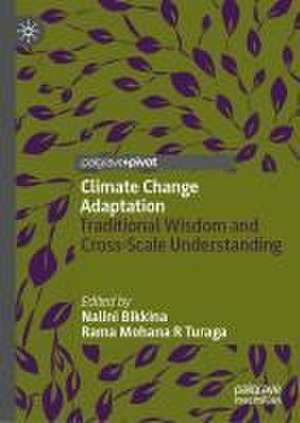Climate Change Adaptation: Traditional Wisdom and Cross-Scale Understanding
Editat de Nalini Bikkina, Rama Mohana R. Turagaen Limba Engleză Hardback – 21 iun 2024
Preț: 235.58 lei
Nou
Puncte Express: 353
Preț estimativ în valută:
45.08€ • 48.20$ • 37.59£
45.08€ • 48.20$ • 37.59£
Carte tipărită la comandă
Livrare economică 14-19 aprilie
Preluare comenzi: 021 569.72.76
Specificații
ISBN-13: 9789819710751
ISBN-10: 9819710758
Pagini: 80
Ilustrații: XXVI, 151 p. 12 illus., 10 illus. in color.
Dimensiuni: 148 x 210 mm
Greutate: 0.36 kg
Ediția:2024
Editura: Springer Nature Singapore
Colecția Palgrave Macmillan
Locul publicării:Singapore, Singapore
ISBN-10: 9819710758
Pagini: 80
Ilustrații: XXVI, 151 p. 12 illus., 10 illus. in color.
Dimensiuni: 148 x 210 mm
Greutate: 0.36 kg
Ediția:2024
Editura: Springer Nature Singapore
Colecția Palgrave Macmillan
Locul publicării:Singapore, Singapore
Cuprins
1: Introduction.- 2: Learning Climate Change from Traditional Communities.- 3: Ethical Adaptation to Climate Change and People Centered Development.- 4: Farmer Knowledge and the Politics of Climate Resilience.- 5: Of Climate, Communities and Commons: A Gendered Perspective.- 6: Tribal Communities of the northern Eastern Ghats: Forest Dependence in the Context of Changing Climate.- 7: Forest Rights and Climate Change: Conservation through Indigenous Knowledge.- 8: Integrating De-carbonization with Adaptation Measures.- 9: Impact of Climate Change on Forest Dwelling Communities and the Role of Forest Department in Mitigation.- 10: Leveraging Human-Natural World Intersections for Climate Change Adaptation.- 11: Integrating Formal Science with Local Participation: The Case of Medmerry Peninsula.- 12: Climate Change Adaptation: A Thematic Analysis of Narratives of Fisher Folk and Tribal Farmers.
Notă biografică
Nalini Bikkina is Professor at GITAM School of Humanities and Social Sciences. An ICSSR Doctoral Fellow, her research interests are in the interdisciplinary social sciences with an emphasis on public policy. She worked on projects funded by the UGC and the ICPR in her capacity as a Project Fellow. She was also the Principal Investigator in projects funded by the Indian Institute of Management, Ahmedabad and the SPARC Scheme of the Ministry of Education. She is a Fulbright Academic and Professional Excellence Fellow and a Fellow of the Royal Society of Arts, London. She won the Fulbright Alumni Award.
Rama Mohana R. Turaga has been a faculty in the public systems group of the Indian Institute of Management Ahmedabad for more than 12 years, teaching environmental sustainability and public policy. After his Ph.D. in environmental policy from the Georgia Institute of Technology, Atlanta, Dr. Turaga was a research associate for more than two years at Dartmouth College, USA, working on research projects funded by the US Environmental Protection Agency. Prior to his Ph.D., Dr. Turaga was an environmental management consultant working with industries and the government on projects related to environmental impact assessment and industrial pollution control.
Rama Mohana R. Turaga has been a faculty in the public systems group of the Indian Institute of Management Ahmedabad for more than 12 years, teaching environmental sustainability and public policy. After his Ph.D. in environmental policy from the Georgia Institute of Technology, Atlanta, Dr. Turaga was a research associate for more than two years at Dartmouth College, USA, working on research projects funded by the US Environmental Protection Agency. Prior to his Ph.D., Dr. Turaga was an environmental management consultant working with industries and the government on projects related to environmental impact assessment and industrial pollution control.
Textul de pe ultima copertă
This book discusses how climate change needs to be anchored in indigenous knowledge with reference to resource management, infrastructure, livelihoods, and social institutions, with a unique focus on risks and provenances of resilience available to the local communities. Beyond the scientific know-how on climate change, this volume highlights traditional wisdom, which through its hands-on learning plays a crucial role in amalgamation with cross-scale understanding. It documents the deliberations of a seminar that brought together traditional wisdom and cross-scale understanding of academicians, researchers, practitioners, and grassroots functionaries directly or indirectly working with communities in the area of climate change adaptation and thereby brings together adaptation and allied practices from across a spectrum of specialties and practitioner contexts. It discusses several insights and novel practices and is purported to provide significant research and policy implications in the spirit of thinking globally but acting locally.
Nalini Bikkina is Director, GITAM School of Humanities and Social Sciences. An ICSSR Doctoral Fellow, her research interests are in the interdisciplinary social sciences with an emphasis on public policy. She worked on projects funded by the UGC and the ICPR in her capacity as a Project Fellow. She was also the Principal Investigator in projects funded by the Indian Institute of Management, Ahmedabad and the SPARC Scheme of the Ministry of Education. She is a Fulbright Academic and Professional Excellence Fellow and a Fellow of the Royal Society of Arts, London. She won the Fulbright Alumni Award.
Rama Mohana R. Turaga has been a faculty in the public systems group of the Indian Institute of Management Ahmedabad for more than 12 years, teaching environmental sustainability and public policy. After his Ph.D. in environmental policy from the Georgia Institute of Technology, Atlanta, Dr. Turaga was a research associate for more than two years at Dartmouth College, USA, working on research projects funded by the US Environmental Protection Agency. Prior to his Ph.D., Dr. Turaga was an environmental management consultant working with industries and the government on projects related to environmental impact assessment and industrial pollution control.
Caracteristici
Explores diverse perspectives of experts from across geographical regions and terrains Discusses grassroots-based research, actions and best practices Networks the know-how of scientists, academicians, practitioners, governments, and civil society organizations
